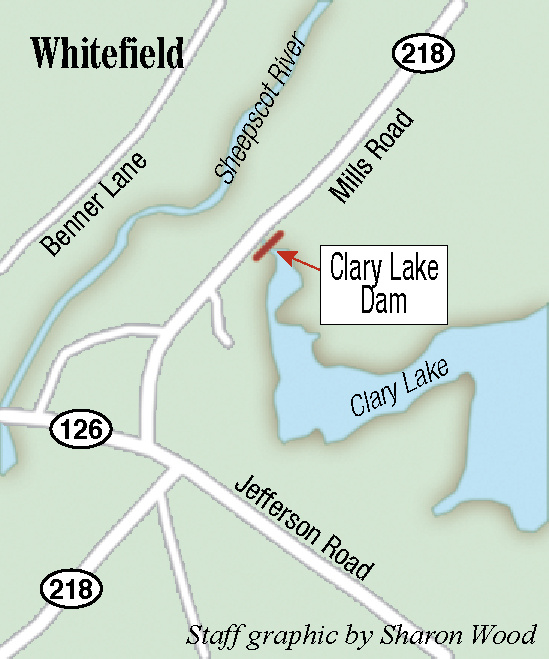Property owners along Clary Lake have been waiting for years hoping a water level order imposed by a state agency would be enforced on the northern Lincoln County lake.
On Monday, they were closer than they have ever been.
That was the deadline by which a decision and order affirming the water level order that was issued in late February could be appealed. It did not appear an appeal had been filed.
“The Clary Lake Association is very pleased with the outcome, and we’re not surprised there will be no appeal,” George Fergusson, secretary of the Clary Lake Association, said.
While the decision clears the way for the state Department of Environmental Protection to take action to enforce the water level order, the way forward is not immediately clear. The latest owner of the dam in North Whitefield that impounds Clary Lake has filed for bankruptcy.
For the last several years, the water level in the lake, which straddles the Whitefield-Jefferson town line, has been so low that access to the lake has been limited, and about 40 acres of wetland have been eliminated.
Now, Fergusson said, the water level in the lake is 33 inches below the top of the dam. That’s not bad considering the gate in the dam is open, but it is lower than the lake level should be at this time of year, he said.
“We look forward to the DEP taking some sort of affirmative action,” Fergusson said. “It’s been a long time coming.”
David Madore, the DEP’s director of communications, said Monday via email that the agency “continues to work with the Attorney General’s Office while we await some resolution in the bankruptcy proceedings.”
The decision and order by Justice Daniel Billings came as a result of an appeal filed in 2014 by the owners of the Clary Lake dam — Paul Kelley, the manager of the Pleasant Pond Mill — and associated property — AquaFortis Associates LLC, and its manager, Richard Smith — to the DEP’s water level order issued earlier that year.
Although problems between owners of the dam along Route 218 and landowners on the lake go back decades, those involved have said the issue worsened about seven years ago. Shortly after, more than 100 property owners near the lake filed their petition with the Maine Department of Environmental Protection asking the department to set a water management plan for the lake.
In 2015, the DEP issued a notice of violation on Kelley, Pleasant Pond Mill, Smith and AquaFortis Associates, citing a lack of action in meeting the requirements of the water level order.
During the appeal process, the issue went to mediation, which ended in May 2015 without resolution. In September 2015, two state lawmakers urged the DEP to take action on the water level order, and the DEP issued a notice of violation against the parties for failing to meet the water level order and failing to obtain DEP approval for a final water level management plan, among other things.
Not long after, Kelley and Pleasant Pond Mill LLC were dismissed from the appeal in Superior Court in Lincoln County, and in 2017 Kelley filed for bankruptcy protection on behalf of Pleasant Pond Mill and also on his own behalf.
On Monday, Timothy Connolly, an attorney with Preti Flaherty who had represented AquaFortis Associates, said he’s no longer representing the limited liability company.
Attempts to reach Kelley and Smith on Monday were not successful.
On Feb. 8, in oral arguments before Billings, Connolly argued the department has overstepped its authority in imposing the order.
“This water level order must be vacated or remanded because the (DEP) has no authority to order repairs of the dam, or coerce repairs through the threat of fines,” Connolly said. The reason is the dam falls under the authority of the Mill Act, he said, and the DEP failed to consider that in taking the action it did.
Connolly also argued the water level order is a regulatory taking without compensation because it deprives the dam owner of its right to use the dam for its own benefit.
Scott Boak, an assistant attorney general appearing for the Department of Environmental Protection, said the AquaFortis Associates argument is without merit because the Mill Act is not at issue.
“Once the DEP receives the right petition that requires it to hold a hearing (on a water level), that triggered jurisdiction. End of story,” Boak said. “The DEP’s jurisdiction is over the water body.”
Jessica Lowell — 621-5632
Twitter: @JLowellKJ
Send questions/comments to the editors.





Comments are no longer available on this story